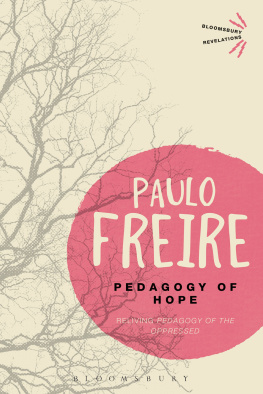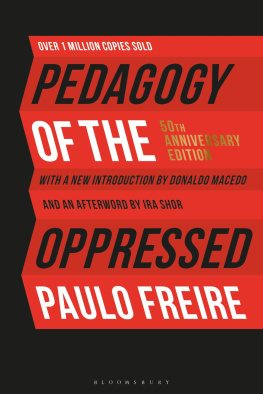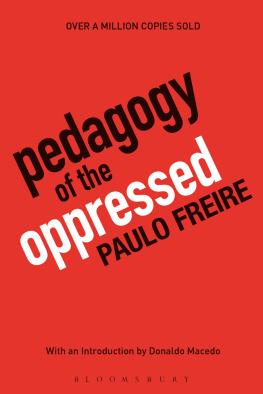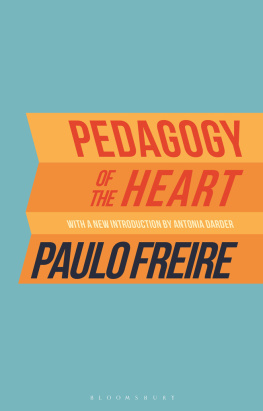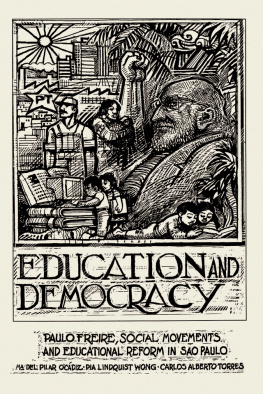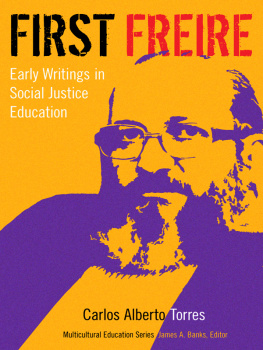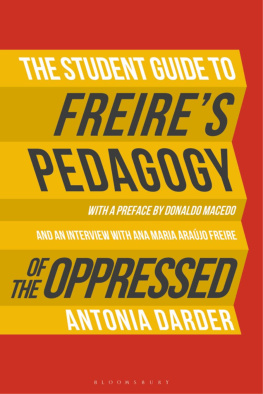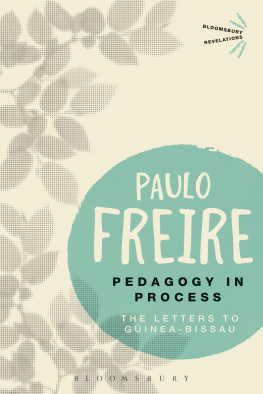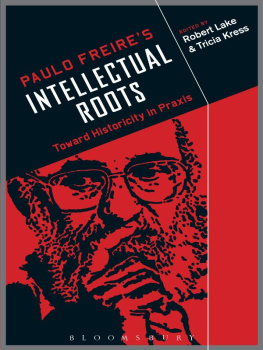Pedagogy of Hope
TITLES IN THE BLOOMSBURY REVELATIONS SERIES
Among the Dead Cities , A. C. Grayling
Towards the Light , A. C. Grayling
The Oresteia , Aeschylus
Aesthetic Theory , Theodor W. Adorno
Being and Event , Alain Badiou
On Religion , Karl Barth
The Language of Fashion , Roland Barthes
The Intelligence of Evil , Jean Baudrillard
Key Writings , Henri Bergson
I and Thou , Martin Buber
Never Give In! , Winston Churchill
The Boer War , Winston Churchill
The Second World War , Winston Churchill
In Defence of Politics , Bernard Crick
Intensive Science and Virtual Philosophy , Manuel DeLanda
Cinema I , Gilles Deleuze
Cinema II , Gilles Deleuze
A Thousand Plateaus , Gilles Deleuze and Flix Guattari
Anti-Oedipus , Gilles Deleuze and Flix Guattari
Origins of Analytical Philosophy , Michael Dummett
Taking Rights Seriously , Ronald Dworkin
Discourse on Free Will , Desiderius Erasmus and Martin Luther
Education for Critical Consciousness , Paulo Freire
Marxs Concept of Man , Erich Fromm
To Have or To Be? , Erich Fromm
Truth and Method , Hans Georg Gadamer
All Men Are Brothers , Mohandas K. Gandhi
Violence and the Sacred , Ren Girard
The Three Ecologies , Flix Guattari
The Essence of Truth , Martin Heidegger
The Odyssey , Homer
The Eclipse of Reason , Max Horkheimer
Language of the Third Reich , Victor Klemperer
Rhythmanalysis , Henri Lefebvre
After Virtue , Alasdair MacIntyre
Time for Revolution, Antonio Negri
Politics of Aesthetics , Jacques Rancire
On Late Style , Edward Said
Course in General Linguistics , Ferdinand de Saussure
An Actor Prepares , Constantin Stanislavski
Building A Character , Constantin Stanislavski
Creating A Role , Constantin Stanislavski
Interrogating the Real , Slavoj iek
Some titles are not available in North America.
Pedagogy of Hope
Reliving Pedagogy of the Oppressed
Paulo Freire
With Notes by Ana Maria Arajo Freire
Translated by Robert R. Barr

Bloomsbury Academic
An imprint of Bloomsbury Publishing Plc
| 50 Bedford Square | 1385 Broadway |
| London | New York |
| WC1B 3DP | NY 10018 |
| UK | USA |
www.bloomsbury.com
Bloomsbury is a registered trade mark of Bloomsbury Publishing Plc
English translation first published in 1994 by the Continuum
International Publishing Group Ltd
Copyright 1992 by Paulo Freire
English translation Copyright 1994 by The Continuum Publishing Company
Copyright renewed 1998 by Ana Maria Arajo Freire
This Bloomsbury Revelations edition first published in 2014 by Bloomsbury Academic
All rights reserved. No part of this publication may be reproduced or transmitted in any form or by any means, electronic or mechanical, including photocopying, recording, or any information storage or retrieval system, without prior permission in writing from the publishers.
No responsibility for loss caused to any individual or organization acting on or refraining from action as a result of the material in this publication can be accepted by Bloomsbury Academic or the author.
British Library Cataloguing-in-Publication Data
A catalogue record for this book is available from the British Library.
ePub ISBN : 978-1-4725-3352-4
Library of Congress Cataloguing-in-Publication Data
A catalogue record for this book is available from the Library of Congress
Typeset by Deanta Global Publishing Services, Chennai, India
For Ana Maria, Nita,
who gave me back a taste for life:
when life seemed so long to me,
so nearly hopeless...
I looked at her!
Paulo
In memory of Armando Neves Freire,
excellent brother, fine friend
Paulo
For Stela Bruno, Silvia Temistocles
and Reinilda
With a brotherly embrace
Paulo
For Genove Arajo,
hopeful as a teenager, at ninety
whom I can never pay what I owe,
lovingly,
Paulo
For Z de Melo and Dora
for reasons beyond counting
with an embrace from their friend
Paulo
Contents
We are surrounded by a pragmatic discourse that would have us adapt to the facts of reality. Dreams , and utopia , are called not only useless, but positively impeding. (After all, they are an intrinsic part of any educational practice with the power to unmask the dominant lies.) It may seem strange, then, that I should write a book called Pedagogy of Hope: Reliving Pedagogy of the Oppressed .
But for me, on the contrary, the educational practice of a progressive option will never be anything but an adventure in unveiling. It will always be an experiment in bringing out the truth. Because this is the way I have always thought, there are those who dispute whether or not I am an educator. It happened recently in a meeting at UNESCO in ParisI have been told by someone who was there. Latin American representatives refused to ascribe me the standing of educator. At least I was not an educator as far as they were concerned. And they criticized me for what seemed to them to be my exaggerated politicization.
They failed to perceive that, in denying me the status of educator for being too political, they were being as political as I. Of course, on opposite sides of the fence. Neutral they were not, nor could ever be.
On the other hand, there must be countless individuals who think the way a friend of mine, a university professor, thinks. He came looking for me. In astonishment, he asked, But Paul... a Pedagogy of Hope in the shameless hellhole of corruption like the one strangling us in Brazil today?
The fact is that the democratization of the shamelessness and corruption that is gaining the upper hand in our country, contempt for the common good, and crimes that go unpunished, have only broadened and deepened as the nation has begun to rise up in protest. Even young adults and teenagers crowd into the streets, criticizing, calling for honesty and candor. The people cry out against all the crass evidence of public corruption. The public squares are filled once more. There is a hope, however timid, on the street corners, a hope in each and every one of us. It is as if most of the nation had been taken by an uncontainable need to vomit at the sight of all this shamefulness.
On the other handwhile I certainly cannot ignore hopelessness as a concrete entity, nor turn a blind eye to the historical, economic, and social reasons that explain that hopelessnessI do not understand human existence, and the struggle needed to improve it, apart from hope and dream. Hope is an ontological need. Hopelessness is but hope that has lost its bearings, and become a distortion of that ontological need.
When it becomes a program, hopelessness paralyzes us, immobilizes us. We succumb to fatalism, and then it becomes impossible to muster the strength we absolutely need for a fierce struggle that will re-create the world.
I am hopeful, not out of mere stubbornness, but out of an existential, concrete imperative.
I do not mean that, because I am hopeful, I attribute to this hope of mine the power to transform reality all by itself, so that I set out for the fray without taking account of concrete, material data, declaring, My hope is enough! No, my hope is necessary, but it is not enough. Alone, it does not win. But without it, my struggle will be weak and wobbly. We need critical hope the way a fish needs unpolluted water.
Next page
